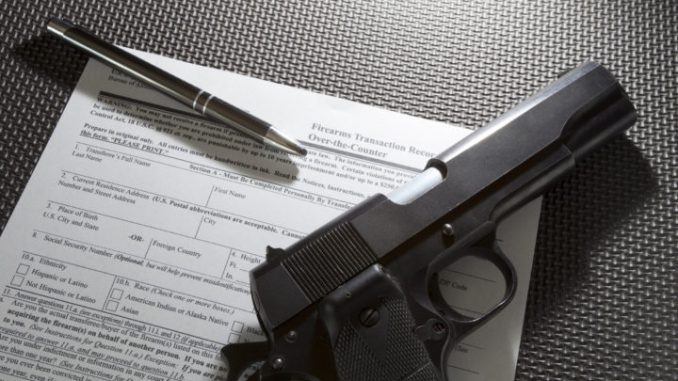
WASHINGTON — According to USA Today, The FBI was flooded Friday with more than 200,000 background check requests for gun purchases, setting a new single day record, the bureau reported Saturday.
In all, the FBI fielded 203,086 requests on Black Friday, up from the previous single-day highs of 185,713 last year and 185,345 in 2015. The two previous records also were recorded on Black Friday.
Gun checks, required for purchases at federally licensed firearm dealers, are not a measure of actual gun sales. The number of firearms sold Friday is likely higher because multiple firearms can be included in one transaction by a single buyer.
The surging numbers received by the bureau’s National Instant Criminal Background Check System (NICS), comes just days after Attorney General Jeff Sessions ordered a sweeping review of the system, which allowed a court-martialed Air Force veteran to purchase the rifle used earlier this month to kill 25 people inside a Sutherland Springs, Texas, church.
The victims included a pregnant woman whose unborn child also died in the Nov. 5 massacre.
Following the shooting, the Air Force acknowledged it had not provided the FBI with details of the court martial, which likely would have blocked the 2016 sale of the murder weapon to Devin Kelley.
In a memo issued Wednesday, Sessions ordered the FBI and federal Bureau of Alcohol, Tobacco, Firearms and Explosives (ATF) to review the NICS system.
The breakdown in the Kelley case highlighted longstanding problems within the system, which for more than 20 years has served as the centerpiece of the government’s effort to block criminals from obtaining firearms. Yet it has largely struggled to keep pace with the volume of firearm transactions and still properly maintain the databases of criminal and mental health records necessary to determine whether buyers are eligible to purchase guns.
Last year, the FBI official overseeing NICS was forced to transfer personnel from construction projects and units that oversee the gathering of crime statistics to keep up with the surge of requests for background checks. The office processed a record 27.5 million background checks in 2016.
Stephen Morris, a former assistant FBI director, told USA TODAY after the shooting that the NICS system has long been plagued by incomplete or outdated information.
In many cases, a background check may show a record of arrest, but there is no additional information to indicate whether the case was dismissed or resulted in a felony conviction which would prohibit a gun purchase.
The mere record of arrest is not enough to prohibit a gun sale, so FBI analysts must race to fill such information gaps within the three-day time period allotted for each check. The search sometimes requires inquiries to police departments, courthouses and prisons across the country to match final dispositions to the incomplete records.
In Kelley’s case, the Air Force not only failed to provide the record of his conviction — it also missed other potential opportunities to alert the FBI to Kelley’s legal troubles. Among them: his initial arrest on domestic abuse charges and his 2012 escape from a New Mexico behavioral health facility, where he was being treated for “mental disorders” in advance of a court martial proceeding.
[adrotate banner=”24″]
Kelley, who was stationed at Holloman Air Force Base, N.M., was regarded as “a danger to himself and others.” He had been caught sneaking firearms onto the base and had lodged death threats against his military superiors.
The Air Force has said it is investigating the breakdown. The Pentagon also is reviewing the case to determine, in part, whether the military should supply arrest records or other types of information to the FBI.
Another mass shooter, who killed four people in California earlier this month, also was barred from gun ownership but was able to evade detection by assembling his own rifles by purchasing components from online sources.
“People should not be able to make their own assault weapons and other guns when those individuals are dangerous and legally barred from buying guns,” said Robyn Thomas, executive director of the Giffords Law Center to Prevent Gun Violence.
The center, named for former Arizona congresswoman Gabrielle Giffords, who survived a 2011 assassination attempt, has called for tighter restrictions on such gun part suppliers.
“Companies that are more worried about making money than the safety of the public or law enforcement officials sworn to protect them shouldn’t be given a platform to sell their products,” Thomas said. “It’s time to turn off the lights on these sites so these companies won’t be able to enable illegal gun trafficking or the next mass shooting.”
[adrotate banner=”24″]
Federal authorities, meanwhile, have for years openly complained that incomplete databases and staff shortages make it difficult to keep pace with the constant stream of background checks required of most new gun purchasers and efficiently trace firearms used in crimes.
In a statement earlier this week, Sessions said NICS “is critical for us to be able to keep guns out of the hands of those that are prohibited from owning them.” He said the Texas shooting “revealed that relevant information may not be getting reported to the NICS — this is alarming and it is unacceptable.”
While gun sales have been surging in recent years — largely driven by fears of more restrictive gun laws proposed during the Obama administration — gun check numbers had leveled off in the first months of the pro-gun Trump administration.
[adrotate banner=”24″]

[pt_view id=”517b65fj16″]



Be the first to comment